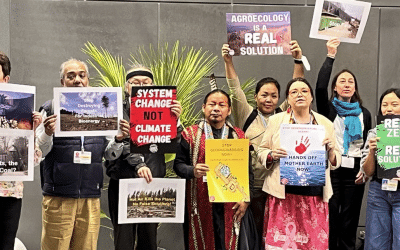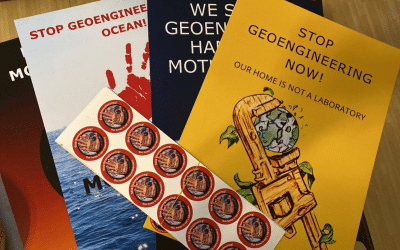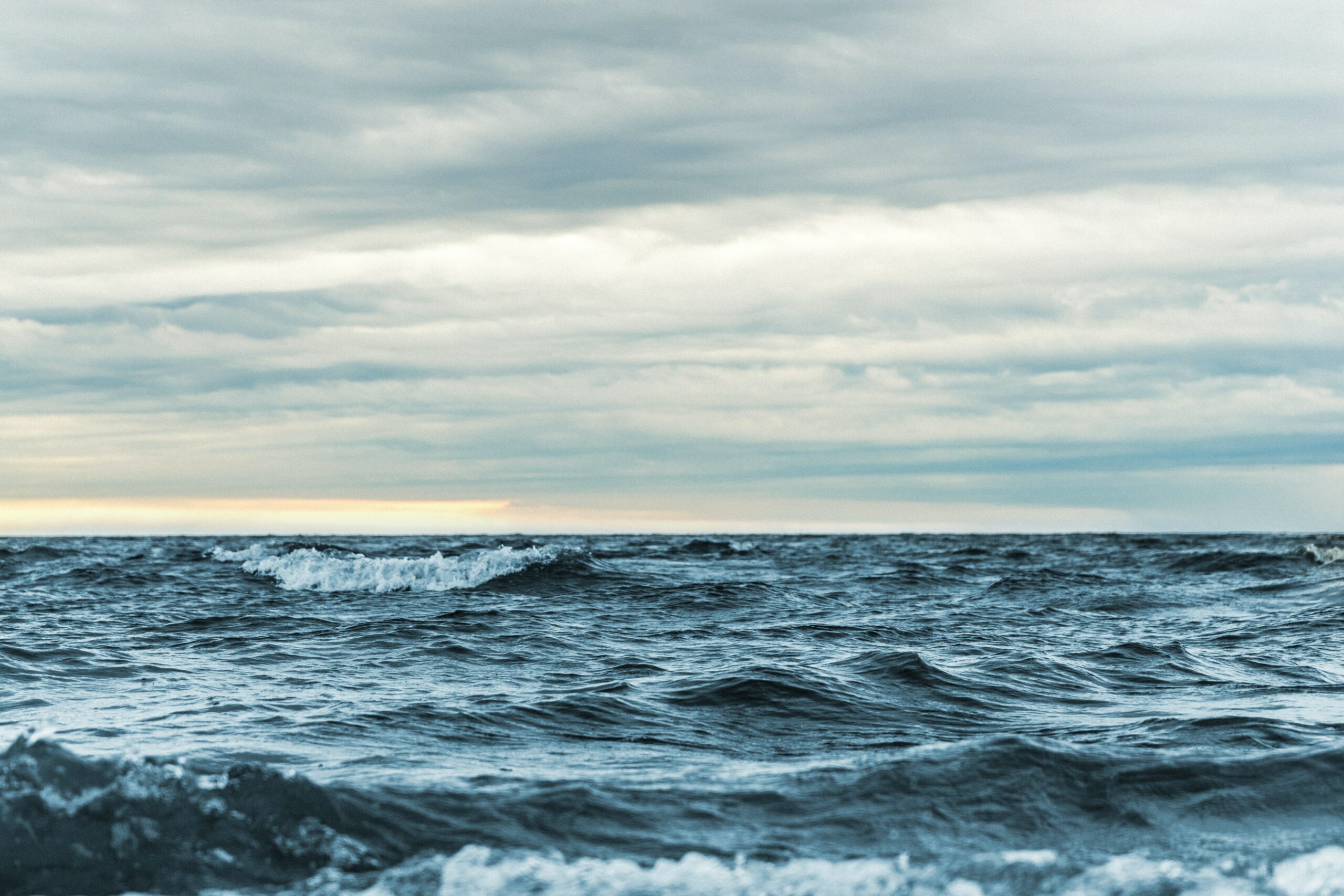On Monday 5th November climate change campaigners from Camp for Climate Action, Rising Tide and BioFuel Watch took action against geo-engineering (deliberate modification of Earth’s environment on a large scale) companies who are hoping to make a great deal of money from carbon credits by encouraging the growth of phytoplankton in the oceans . They claim this will ‘sequester’ carbon dioxide, a technology known as ‘ocean seeding’.
The campaigners held a demonstration outside a meeting of the London Convention on the Prevention of Marine Pollution by Dumping of Wastes. The meeting is deciding on the response by the Convention to the attempts to commercialise the technology. They gave out leaflets to delegates calling on the London Convention to take strong action against this dumping of toxic material, and held a banner reading ‘Toxic Dumping: No Climate Solution’.
Campaigner Sarah Mills said: “These companies don’t care about climate change they are just out to make a fast buck out of the carbon market. This risky technofix won’t work but it will be used to enable the rich to keep polluting the planet while the poor feel the worst effects of climate change.”
Leaflet Text:
Toxic dumping is no solution to climate change
What’s the solution to climate chaos? Renewables? Energy efficiency? Using less? Keeping the fossil fuels in the ground?
Not according to geo-engineering companies like CLIMOS, PLANKTOS, OCEAN NOURISHMENT CORPORATION and ATMOCEAN. They are hoping to make a great deal of money from carbon credits for encouraging the growth of phytoplankton in the oceans which they claim will ‘sequester’ carbon dioxide. Methods proposed include dumping large quantities of tiny iron particles, dumping industrial quantities of synthetic urea, and piping up nutrient rich deep ocean waters to the surface.
– It’s dangerous – Ocean seeding has the potential negative impacts on the marine environment and human health. Concerns include increased production of nitrous oxide and methane, unintended changes in the plankton that could result in production of toxic blooms and effects on the ocean food chain. The International Panel on Climate Change (IPCC) have warned that toxic tides and lifeless oceans might result from such geo-engineering activities [deliberate modification of Earth’s environment on a large scale]. One IPCC report said “geo-engineering options…remain largely speculative and with the risk of unknown side-effects”.
– It’s unproven -Science journal Nature published a study on iron seeding authored by forty-seven ocean scientists concluding that such attempts to artificially seed the ocean were unlikely to sequester much carbon dioxide. There is no way of proving how much carbon dioxide is stored or how long it will be locked away for. The scientists say their results “mean the end of the ‘geo engineering’ utopia that consists of artificially seeding the oceans with iron.”
– It’s a scam – Local and international environmental groups are furious at this risky gamble with sensitive marine ecosystems spurred by the opportunity to make a profit from carbon trading. Do these companies really care about climate change or are they out to make a fast buck? In the words of Planktos CEO Russ George “It’s really more of a business experiment than a scientific experiment.” Ocean Nourishment Corporation are expected to claim fishing rights on the basis of increasing fish stocks because of the phytoplankton blooms.
– It’s a red herring – Even if it worked, which there is no evidence for, ocean seeding is not sustainable or an equitable solution to climate change. Ocean Nourishment’s urea dumping scheme is depending on fast depleting natural gas stocks which may not in the future be available on the vast scale needed for ONC’s scheme. Ocean seeding enables a business as usual approach where the richest are able to buy the right to pollute while the poor become more and more marginalised. We have the solutions to climate change at our fingertips – reducing consumption, relocalising economies, and using existing renewable energy technologies sustainably
– It’s a threat to local economies – The livelihoods of millions of small-scale fisher families depend on the coastal waters surrounding the Philippines and Malaysia, but none of the communities have been consulted about the dumping scheme proposed by ONC. Wilhelmina Pelegrina of SEARICE in the Philippines said “Large-scale urea dumping is treating our oceans like a communal toilet. Our already endangered marine ecosystems are the lifeblood of our communities – and ONC must not be permitted to foul them for their own profit”. Ruperto Aleroza of Kilusang Mangingisda, the Philippine Fisherfolks Movement, said “This technology is unacceptable. It is a dangerous technology that could imperil marine environment which is the main source of survival and livelihood of poor fisherfolks in the Philippines. Under Philippine laws experiments like this must undergo environmental impact assessments and free prior informed consent of communities that are potentially affected. ”
We demand a moratorium . No to voluntary codes of conduct.
Climos believe that by offering to undertake a voluntary code of conduct they can placate the concerns of scientists and environmentalists.
Voluntary codes of conduct allow companies to make their own decisions on what is acceptable behaviour and are a deliberate strategy to stave off regulation by national governments and international organisations who have a responsibility to protect the natural environment in the face of dangerous schemes such as the one proposed.
– We call on the London Convention, national governments and international agencies to reject geo-engineering scams and promote real solutions to climate change.
– We call on Climos, Planktos, Ocean Nourishment Corporation and Atmocean to abandon these mistaken schemes.
– We call on all members of the public concerned about the future to take action on climate change and against the destructive impacts of these companies.
More information:
Canadian NGO, the ETC Group, has collated scientific analyses and civil society critiques of ocean dumping. Information is available at:
www.etcgroup.org/en/issues/geoengineering.html



